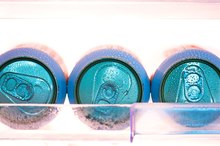What Products Contain Citric Acid?
Citric acid occurs naturally in citrus fruits, such as oranges, grapefruits, lemons and limes, as well as other types of fruit including pineapple and tomatoes. Citric acid is often added to products to make them taste sour, to ferment them or to help preserve them. If you have an intolerance or allergy to citric acid, it is helpful to know some of the most common products that contain it so you can avoid them as you work to reduce your intake of this acid.
Canned Foods
Many canned foods contain added citric acid because it helps extend the shelf life of the product as well as enhance the flavor, notes Lisa Rayner, author of "The Natural Canning Resource Book: A Guide to Home Canning with Locally-Grown, Sustainably-Produced and Fair Trade Foods." Rayner adds that citric acid helps improve the safety of your canned goods by preventing bacteria from growing on the food as well as reducing the chance of the product spoiling before it is opened or consumed. If you can your own foods, you should add citric acid to help extend the amount of time your foods will remain safe to eat.
Soft Drinks
Allergic Reactions to Malic Acid
Learn More
The sharp bite that you often get from a soft drink is often due to the addition of citric acid. The most common soft drinks in which citric acid is found are fruit-flavored ones, report David P. Steen and P. R. Ashurst, authors of "Carbonated Soft Drinks: Formulation and Manufacture." Citric acid complements the taste of most fruits and fruit flavorings and helps extend the shelf life of soft drinks. If you cannot or do not want to consume citric acid, make sure to read the ingredient labels on your favorite soda products to ensure that you choose one that does not contain this acid.
Wine
The amount of citric acid added to a wine helps determine the quality and taste, reports Jan Farkas, author of "Technology and Biochemistry of Wine." While citric acid helps preserve canned foods and soft drinks, it does not have the same benefit for wine. The more citric acid added to a wine, the shorter amount of time you have to drink it before it begins to taste bitter and sour. If you choose a wine that does contain citric acid, make sure to drink if rather quickly to ensure that you still enjoy the best-tasting wine possible.
Related Articles
References
- The Natural Canning Resource Book: A Guide to Home Canning with Locally-Grown, Sustainably-Produced and Fair Trade Foods; Lisa Rayner; 2010
- Carbonated Soft Drinks: Formulation and Manufacture; David P. Steen and P. R. Ashurst; 2006
- Technology and Biochemistry of Wine; Jan Farkas; 1988
Writer Bio
Sara Ipatenco has taught writing, health and nutrition. She started writing in 2007 and has been published in Teaching Tolerance magazine. Ipatenco holds a bachelor's degree and a master's degree in education, both from the University of Denver.









